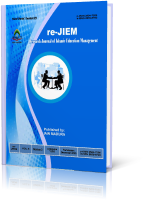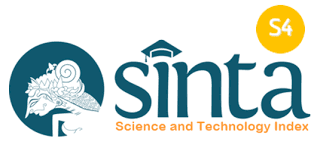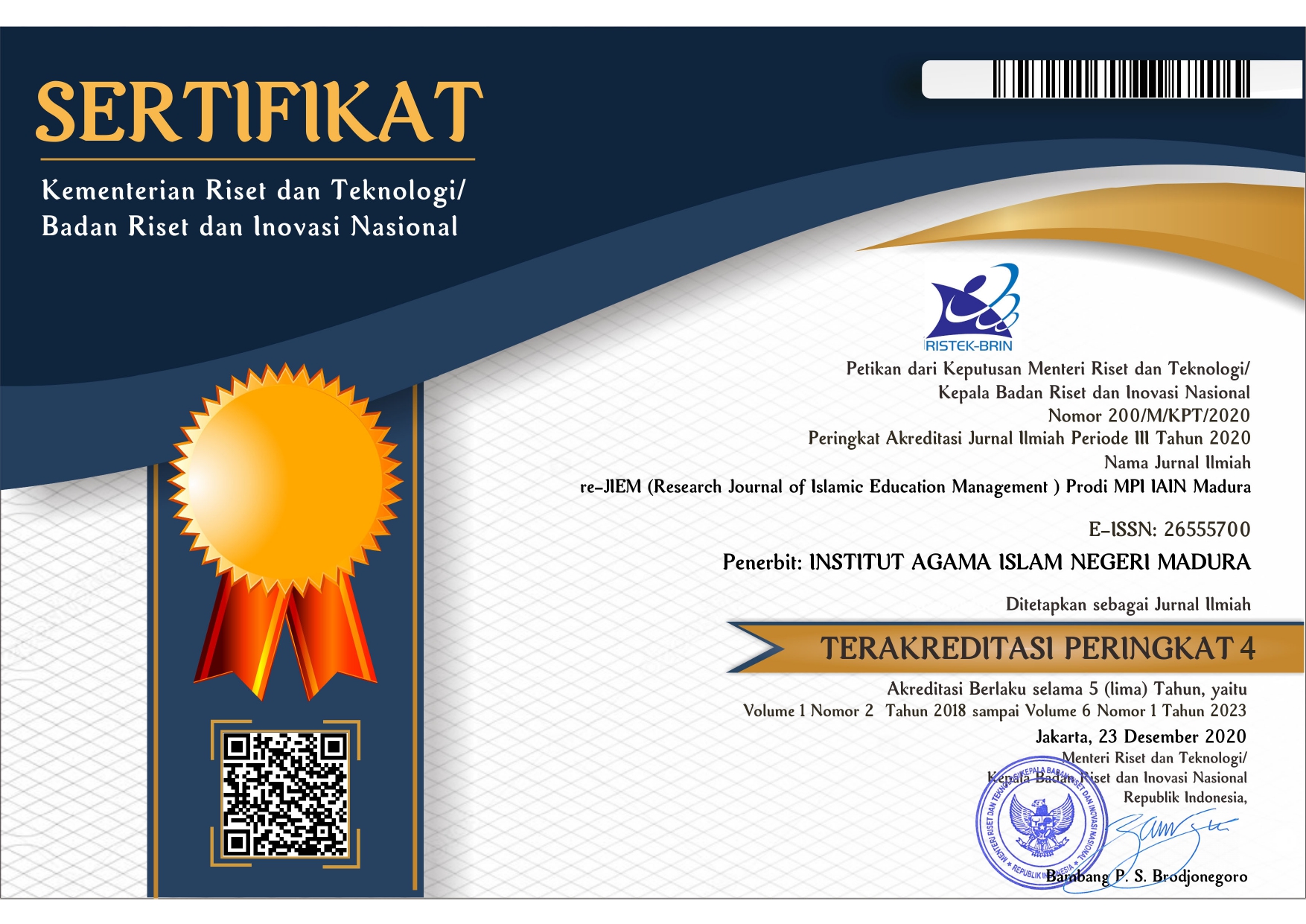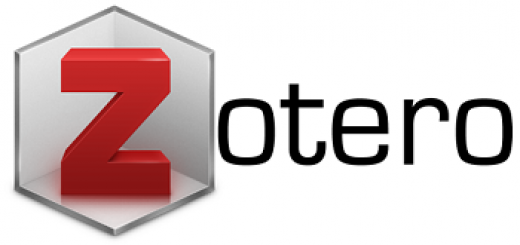POLA PENERAPAN AUTHENTIC ASSESMENT PADA MADRASAH ALIYAH NEGERI DI KABUPATEN PIDIE - ACEH
 Abstract views: 180
,
Abstract views: 180
,
 PDF downloads: 125
PDF downloads: 125
Abstract
The implementation of authentic assessment in the field has not yet been fully optimized. Teachers at madrasahs still face difficulties in planning and carrying out authentic assessments. This research aims to: first, analyze the implementation of cognitive domain evaluation; second, analyze the implementation of affective domain evaluation; and third, analyze the implementation of psychomotor domain evaluation. The study was conducted at Madrasah Aliyah Negeri within the Pidie District, Aceh. This research employs a qualitative approach, using interviews as the data collection technique. The findings of the study reveal several key points: first, the implementation of cognitive domain evaluation in Madrasah Aliyah is carried out with a 100% score, utilizing essay tests at 43% and objective tests at 57%. Second, the use of instruments for the affective aspect by teachers is at 57%, which is considered moderate. Third, the use of instruments for the psychomotor aspect by teachers is at 43%, which is considered low.
Downloads
References
Alselm Strauss & Juliet Corbin, Basic of Qualitative Research: Grounded Theory, Procedures and Techniques, California: SAGE Publication, inc, (1990)
Amir Syamsudin, Budiyono Budiyono, Sutrisno Sutrisno, Model of Affective Assessment of Primary School Students, Journal REiD (Research and Evaluation in Education), 2.1. (2016), hal. 25-41
Andi Prastowo, Pembelajaran Konstruktif Scientific untuk Pendidikan Agama di Sekolah dan Madrasah, Jakarta: Rajawali Press, (2014), hal. 222.
Echols, John M.dan Hasan Shadily, Kamus Inggris Indonesia, Jakarta: Gramedia, (2017)
Farid Noor Ramadlon, Roro Dwi Astuti, Affective Aspect and Speaking Skill of the Students of English Education Program, Eduvest, Journal of Universal Studies. 2.1. (2022)
Fitriah, Implementasi Penilaian Autentik di Madrasah Ibtidaiyah Hulu Sungai Selatan. Ulul Albab: Jurnal Ilmiah Multi Disiplin, 2.6 (2023), hal. 2239-2249
Gito Supriadi, Kompetensi Guru Dalam Melaksanakan Penilaian Autentik Di Madrasah Aliyah Negeri (Man) Pulang Pisau Kabupaten Pulang Pisau Kalimantan Tengah. JEP: Jurnal Evaluasi Pendidikan, 12.1(2021), hal. 12-19
Hadini, H., Imamuddin, M.I., Realita R. Pola Assesment Dalam Kebijakan Merdeka Belajar Menurut Perpektif Pendidikan Islam. Darul Ilmi: Jurnal Ilmu Kependidikan dan Keislaman, 11.1, (2023). 89-105
Hambali Alman Nasution, Implementation of Islamic Religious Education Curriculum. Belajea: Jurnal Pendidikan Islam, 6.1. (2021), hal. 1-14
Hayati Syafri, Expanding Instructional Model Socio Affective Strategy for Speaking Skill in Islamic Institution, Proceding of ISELTS FBS Universitas Negeri Padang, 4.1., (2016), hal. 363-376
Imam Gunawan, dan Anggarini Retno, Palupi Taksonomi Bloom, Revisi Ranah Kognitif, Kerangka Landasan Untuk Pembelajaran, Pengajaran dan Penilaian, Jurnal Premier Educandum, 2,2 (2012), hal. 98-117
Imamuddin, M. "Pelaksanaan Penilaian Autentik Di Madrasah (Studi Pada Guru Matematika Di Madrasah Tsanawiyan Negeri 2 Bukittinggi)." re-JIEM (Research Journal of Islamic Education Management) 5.1 (2022): 1-12.
Imamuddin, M., and Isnaniah Isnaniah. "Perencanaan, Pelaksanaan, dan Pelaporan Penilaian Autentik oleh Guru Matematika Madrasah." KARIWARI SMART: Journal of Education Based on Local Wisdom 2.1 (2022), hal. 9-19
Kuni Muntafiah Jamilah, dan Agus Zaenul Fitri, The Implementation of Authentic Assessment in Thematic Learning at Islamic Elementary School. At-Thullab: Jurnal Pendidikan Guru Madrasah Ibtidaiyah, 6.2 (2022), hal. 96-110
Kusaeri & Suprananto, Pengukuran dan Penilaian pendidikan. Yogyakarta: Graha Ilmu (2012).
Muhibbinsyah, Psikologi Belajar, Jakarta: RajaGrasindo, (2003).
Ningsih, Retno Sulistio & Nur Wahyuni, Evaluating The Implementation Of Authentic Assessments In Junior High School English Lesson. Jurnal Penelitian dan Evaluasi Pendidikan, 24.1 (2020), hal. 116-124
Riskan Qadar, Samsiah Samsiah, Zeni Haryanto, The Use of Affective and Cognitive Assessment on the Learning of Mirrorsand Lenses through the Inquiry Laboratory Approach. Jurnal Penelitian dan Pembelajaran IPA (JPPI). 4.1. (2018), hal. 25-34
Rukmini, Elisabeth, Deskripsi Singkat Revisi Taksonomi Bloom. Majalah Ilmiah Pembelajaran, 2.6. (2009),
Salminawati, Yusnaili Budianti, dan Rahaji Sinaga, Implementasi Kurikulum Dan Metode Pendidikan Menurut Abdullah Nashih Ulwan Di SMP Berbasis Islam Terpadu Sekota Subulussalam. Belajea: Jurnal Pendidikan Islam, 8.1(2023), hal, 119-130
Setiadi, Hari, Pelaksanaan Penilaian Pada K-13. Jurnal Penelitian dan Evaluasi Pendidikan, 20. 2 (2016), hal. 165-178
Sukino, Pengembangan Kurikulum Dan Pendekatan Pembelajaran Pendidikan Agama Islam Kontekstua, Belajea: Jurnal Pendidikan Islam, 8(3), (2023). Hal, 1-8
Supardi, Penilaian Autentik: Pembelajaran Afektif, Kognitif dan Psikomotor, Konsep dan Aplikasi, Jakarta: Rajawali Press, (2015)
Sutarjo Adisusilo, Pembelajaran Nilai-Nilai Karakter, Jakarta: Rajawali press, (2013), hal. 252
Uno, Hamzah B, dkk, Desain Pembelajaran, Bandung: MQS Publishing, (2010)
Copyright (c) 2024 Hadini Hadini, M. Imamuddin, Nafiar, Nurbayani

This work is licensed under a Creative Commons Attribution-ShareAlike 4.0 International License.
Authors who publish with this journal agree to the following terms:
Authors retain copyright and grant the journal right of first publication with the work simultaneously licensed under a Creative Commons Attribution-ShareAlike 4.0 International License that allows others to copy and redistribute the material in any medium or format with an acknowledgment of the work's authorship and initial publication in this journal and also allows to remix, transform, and build upon the material for any purpose, even commercially with contributions under the same license as the original.
Authors are able to enter into separate, additional contractual arrangements for the non-exclusive distribution of the journal's published version of the work (e.g., post it to an institutional repository or publish it in a book), with an acknowledgment of its initial publication in this journal.
Authors are permitted and encouraged to post their work online (e.g., in institutional repositories or on their website) prior to and during the submission process, as it can lead to productive exchanges, as well as earlier and greater citation of published work.



























